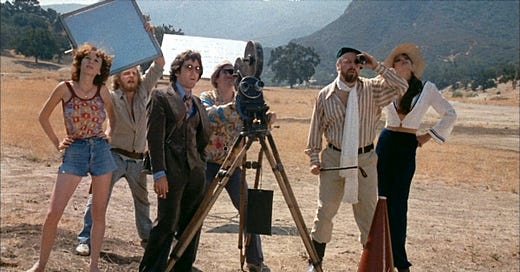The Roast of Roger Corman
With their affectionate New World satire 'Hollywood Boulevard,' Joe Dante and Allan Arkush offered B-movie connoisseurs a tour of the Corman sausage factory.
“In this film, we’ve taken the myth of Romeo and Juliet, combined it with high-speed car action and a sincere plea for nuclear controls in our lifetime.” — Paul Bartel, on the set of Atomic War Brides in Hollywood Boulevard
When the legendary producer and director Roger Corman died last week at age 98, he was properly memorialized as one of the most influential figures in American filmmaking over the second half to the 20th century. Through outfits like American International Pictures and New World Pictures, Corman has turned low-budget genre films into an incubator for a generation of big-name directors (Francis Ford Coppola, Jonathan Demme, Peter Bogdanovich, Monte Hellman, John Sayles, Joe Dante) and stars (Jack Nicholson, Peter Fonda, Bruce Dern, Diane Ladd), all while supplying drive-ins and seedier movie houses with cheap thrills for a tidy profit. He directed several cult favorites himself, including eight Edgar Allan Poe adaptations over a five-year stretch; imported work from major filmmakers abroad; and created a business model that proved both remarkably sustainable and seemingly not replicable. He legitimately changed the course of American filmmaking.
But let’s be real about the movies. There were plenty of good movies that came out of the Corman production machine—though greatness, save arguably for Bogdanovich’s Targets, proved elusive—but art was a distant consideration from the cold business of supply-and-demand. When we talk about important directors cutting their teeth at the Roger Corman School of Filmmaking, the names are far more impressive than the work they did for Corman: Another way of saying that Corman produced films by Coppola, Scorsese, and Demme is to say that he produced Dementia 13, Boxcar Bertha, and Caged Heat. You may be able to squint at a film like Caged Heat and pick up on the humor, humanity and progressive-mindedness that would define Demme’s later work, but drive-in audiences would not have felt it defied their expectations of a standard women-in-prison movie. It’s still about a sexy, multi-racial cadre of inmates who get into catfights, take showers, handle abuse from the warden, and bust out of the joint together.
Yet there were a small handful of filmmakers who thrived in Corman-land because they had some genuine enthusiasm for the schlock he put out into the world—the biker movies, the creature features, the women-in-prison films, the drug freak-outs, the cheap-o science fiction. Two of those filmmakers were Joe Dante and Allan Arkush, who collaborated first with Corman on the 1976 satire Hollywood Boulevard and then later on 1979’s Rock ’n’ Roll High School, which is directed by Arkush, though Dante contributed to the story and filled in briefly for Arkush when exhaustion took him out of the picture. Rock ’n’ Roll High School, their raucous musical-comedy about The Ramones (and the irrepressible P.J. Soles) unleashing chaos at Vince Lombardi High School, is among the most beloved films in the Corman catalog. But Hollywood Boulevard was the film I thought about most after hearing of Corman’s death, because it so thoroughly (and affectionately) embodies the spirit of his work as a producer of shoestring exploitation movies. He was a brilliant businessman, but he was most assuredly not in the business of making masterpieces.
Hollywood Boulevard began life as a bet between Corman and its producer, Jon Davison, whose future credits would include another spoof, Airplane!, four years later and Paul Verhoeven’s RoboCop and Starship Troopers. Davison wagered that he could make the cheapest film in New World Pictures and he was true to his word: Hollywood Boulevard was shot in 10 days on a $54,000 budget, using the short ends of raw stock from other films and generous amounts of footage from other New World productions. But such built-in liabilities were assets for Dante and Arkush, who seize the opportunity to roast Corman for just this sort of fly-by-night operation. The cheaper and more patched-together the film looks, the greater the comic verisimilitude. More money would have added detrimental polish. Dante had cut trailers for Corman and knew how to slap something together.
Keep reading with a 7-day free trial
Subscribe to The Reveal to keep reading this post and get 7 days of free access to the full post archives.




